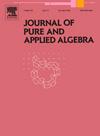Semi-galois Categories I: The classical Eilenberg variety theory
IF 0.7
2区 数学
Q2 MATHEMATICS
引用次数: 0
Abstract
This paper is an extended version of our proceedings paper [49] announced at LICS'16; in order to complement it, this version is written from a different viewpoint including topos-theoretic aspects of [49] that were not discussed there. Technically, this paper introduces and studies the class of semi-galois categories, which extend galois categories and are dual to profinite monoids in the same way as galois categories are dual to profinite groups; the study on this class of categories is aimed at providing an axiomatic reformulation of Eilenberg's theory of varieties of regular languages—a branch in formal language theory that has been developed since the mid 1960s and particularly concerns systematic classification of regular languages, finite monoids and deterministic finite automata. In this paper, detailed proofs of our central results announced at LICS'16 are presented, together with topos-theoretic considerations. The main results include (I) a proof of the duality theorem between profinite monoids and semi-galois categories, extending the duality theorem between profinite groups and galois categories; based on these results on semi-galois categories we then discuss (II) a reinterpretation of Eilenberg's theory from a viewpoint of the duality theorem; in relation with this reinterpretation of the theory, (III) we also give a purely topos-theoretic characterization of classifying topoi of profinite monoids M among general coherent topoi, which is a topos-theoretic application of (I). This characterization states that a topos is equivalent to the classifying topos of some profinite monoid M if and only if is (i) coherent, (ii) noetherian, and (iii) has a surjective coherent point .
求助全文
约1分钟内获得全文
求助全文
来源期刊
CiteScore
1.70
自引率
12.50%
发文量
225
审稿时长
17 days
期刊介绍:
The Journal of Pure and Applied Algebra concentrates on that part of algebra likely to be of general mathematical interest: algebraic results with immediate applications, and the development of algebraic theories of sufficiently general relevance to allow for future applications.

 求助内容:
求助内容: 应助结果提醒方式:
应助结果提醒方式:


